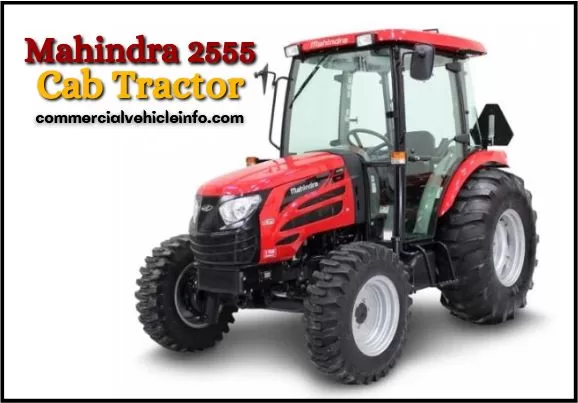How Much Does A Day Cab Tractor Weight In the transport industry, understanding the capacity of a day-cab tractor is vital. Day tractor cabs are the kind of truck that is commonly employed for regional or short-haul transport.

They are made to be efficient and have mobility, which makes them perfect for urban areas as well as shorter distances.
In this article, we will examine the weight of day cab tractors their importance, as well as the various elements that can impact their performance.
What is a day cab tractor?
- A day-cab tractor is one type of semi-truck that is intended for shorter trips, and does not have sleeping space.
- It is also referred to as a day cab truck or simply the word “day cab.
- Contrary to sleeper cabs, which are fitted with bed spaces for drivers who travel long distances Day cabs are designed to maximize the space for cargo and their maneuverability.
- They are often employed to facilitate local delivery, regional transportation as well as other uses which do not require an overnight stay.
- A day cab is likely to be a less basic semi-truck in comparison to a sleeper truck which has only one area for drivers and a passenger and a rear window.
- The windows added make it easier to reverse, and also provide an additional rear view area.
- A day cab is most suitable for shorter journeys since its compact bodies let truck drivers get around better and also make it easier to navigate through tight and narrower areas.
The Importance Of Knowing The Weight Of A Day Cab Tractor

The capacity of a day cab tractor is vital for many reasons:
Conformity with the lawful weight limitations
- Trucks that exceed the weight limit set by law can be subject to penalties and fines.
- Knowing how much weight is a day cab tractor, truck drivers can be sure that they remain within the limits of the law and avoid any legal ramifications.
Safe on the road
- The overloaded truck can cause structural damage and increase the chance of accidents.
- Knowing the capacity of a day cab tractor, truck drivers can make sure that they are not over the weight limit for safe use and protect the safety of their passengers along with their cargo as well as the other road users.
Fuel efficiency
- A tractor’s weight day cab tractor directly impacts its efficiency in fuel. Larger trucks need much more power to maneuver which results in an increase in fuel consumption.
- By reducing the vehicle’s weight, truck drivers can increase the efficiency of their fuel and lower operating expenses.
Processing and Performance
- Proper weight distribution is vital to maintain the stability and safety of a day-cab tractor. A truck loaded too heavily can have a negative impact on acceleration, braking, and agility.
- Knowing the load, truckers can make sure that the load is evenly distributed and improve the performance and handling capabilities of the vehicle.
Preventing infrastructure damage
- Trucks that are overloaded can cause damage to bridges, roads, or other types of infrastructure.
- By being aware of how much weight a daily tractor cab and following the weight limit, truckers can aid in preventing destruction to infrastructure and aid in improving the maintenance and overall condition of our transportation system.
Factors That Affect The Weight Of A Day Cab Tractor
Many aspects can impact the weight of a day-cab tractor, for example:
Size and type of engine
- The type and size that the engine can dramatically affect the overall weight and capacity of a day cab tractor.
- The larger engines, like ones with greater power and torque ratings, are generally heavier. Furthermore, different engines like natural gas, diesel, and electric can differ in their weight.
Chassis configuration
- The design that the chassis is built, such as suspension, frame, and axles can influence how much weight a day cab tractor has.
- Different designs of chassis and different material choices can result in different weights. For example, aluminum light frames can lower the weight of a truck when compared to steel frames made of traditional.
Equipment and features that are additional
- The addition of extra options and features can increase an already heavy cab tractor. These may include safety features, comfort options and cargo handling equipment, and even specialized equipment.
- Truck drivers often have to find a balance between the desirable features they want and the load of the truck.
The gross weight of the combination vehicle (GCVW)
- GCVW is the term used to describe the GCVW is the weight that is the highest of the fully loaded trailer and truck combination.
- The GCVW can fluctuate based on the terrain, speed on the road the tire size and the axle ratio needed.
Limits of weight legal
- Authorities set legal weight limits for trucks in order to guarantee road safety and safeguard infrastructure. These weight limits differ by region and are based on factors like the number of axles used, the spacing of the axles, and the nature of the road.
- The truck operators must adhere to these weight limits in order to stay clear of penalties, fines, and possible harm to the infrastructure or vehicle.
Average Weight Range Of Day Cab Tractors

The weight range for a day cab tractor can vary based on different variables, including the particular model manufacturer, model, and configuration. Although the weight can vary from one model to another, the following info gives an idea of the typical weight range:
- On average, day cab tractor weights typically range from 15,000 to 25,000 lbs (6,800 to 11,300 kgs).
- However, it is crucial to keep in mind that the range can differ significantly and a few models may have a weight that is greater or lesser than the average.
It’s important to remember how much weight a single-day tractor with a cab can be affected by factors like the size of the engine and its type of chassis, the configuration of the chassis, other attributes and accessories, as well as the weight limit set by law.
These elements can affect the load of the car and may result in variances within the weight range.
Why Weight Matters In The Transportation Industry

Weight is a factor in the transport industry for various reasons:
- Safety: Overloading a truck can cause structural damage and increase the likelihood of accidents. The proper distribution of weight is vital to maintain stability and for ensuring safety when operating the day-cab tractor. By adhering to weight limitations and maximizing weight distribution truck drivers can assist in ensuring the safety of their cargo, themselves, and the others on the road.
- Efficiency of fuel: The weight of the day cab tractor directly influences its efficiency in fuel. Heavy trucks consume much more power to drive them, resulting in higher consumption of fuel. By reducing the load of the vehicle the truck drivers can increase efficiency in fuel consumption and cut down on operating costs.
- Protection of the infrastructure: Overloaded trucks can cause destruction to bridges, roads as well as other structures. By following weight limits and dispersing the load, truck drivers can aid in preventing damage to infrastructure and aid in maintaining the general health of the transport network.
- Legal conformity: Authorities impose legal weight limits on trucks in order to ensure safety on the road and safeguard infrastructure. Truck drivers must comply with these weight limits in order to avoid penalties, fines, and possible destruction either to their vehicle, or the infrastructure.
- Efficiency and performance: Proper weight distribution is vital to maintain stability and safe handling of a day-cab tractor. By maximizing the weight of the vehicle truck drivers can enhance productivity and performance without risking safety or the infrastructure.
Legal Weight Limits For Day Cab Tractors
To ensure safety on the road and safeguard infrastructure, authorities have imposed weight limits that are legal for trucks. The limits differ by region and are based on factors such as a number of axles and axle space and the kind of road.
The truck operators must be aware of the weight limits set by law to stay clear of penalties, fines, and possible harm to the vehicle or infrastructure.
How Weight Affects Fuel Efficiency And Performance
A tractor’s weight day cab tractor directly impacts its efficiency in terms of fuel and performance. Heavy trucks use more energy to increase as well as maintain their speed. which results in an increase in energy consumption.
By maximizing the vehicle’s weight Operators can lower fuel costs and boost the overall efficiency.
It also affects performance and handling. A truck that is overloaded can result in a decrease in acceleration, braking distances that are longer, and less ability to maneuver. Proper weight distribution is vital to maintain stability and safe handling when driving.
The Impact Of Weight On Tire Wear And Maintenance

- The weight of the vehicle plays an important factor in maintenance and tire wear. The stress of overloaded trucks puts a lot on tires, resulting in the wear of tires being faster and an increased chance of blowouts.
- By observing weight limits and evenly distributing the load, truck drivers can prolong the life of their tires, and also decrease the cost of maintenance.
Safety Considerations Related To Weight
- The weight is an important safety factor in the transport industry. A truck that is overloaded can weaken its structural integrity which can increase the likelihood of injuries and equipment failures.
- A proper weight distribution system and adherence to the legal weight limits are crucial to ensure security for the motorist, the cargo, and all road users.
Weighing Scales And Load Cells
- A highly precise method to measure the mass of a daily taxi tractor is by using weight scales or load cells. These gadgets can be used to determine the weight of a complete vehicle or just specific axles.
- Truck drivers can make use of weigh stations that are open to the public or private scales for precise weight measurements.
Manufacturer Specifications And Documentation
- The manufacturers of trucks offer specifications and documents that detail details about the mass of their trucks. These details can be located in owner’s manuals, specifications sheets or on the site of the manufacturer.
- It’s important to keep in mind the fact that those weights are generally for normal configurations and may differ based on additional options or the level of customization.
The Role Of Weight In Determining Payload Capacity
- The weight of a day cab tractor is vital to know the capacity to payload. Payload capacity is the maximum amount of cargo the truck can safely transport.
- When subtracting the mass of a completely empty vehicle from its Gross Vehicle Weight Rating (GVWR) operators can identify the payload capacity.
Weight Distribution And Its Effects On Stability And Handling
- Proper weight distribution is vital to maintain stability and secure handling of a tractor cab. Inconsistent distribution of weight can cause imbalanced handling, more tire wear, and diminished stability.
- The truck operators should follow the guidelines of their manufacturer and the best practices for weight distribution to improve safety and performance.
Freightliner Day Cab Weight
The weight of the Freightliner day cab can be different based on the particular model as well as the configuration. Here is some of the information we have gathered from the results of a search:
- A Freightliner Cascadia day cab truck can carry up to 80,000 lbs, this is the maximum weight allowed in several states.
- The day-cab tractor can boost capacity by about 1,500 pounds when in comparison to a sleeper-cab tractor.
- The typical day cab tractors, sometimes referred to as cabs, typically weigh between 17,000 and 20.000 pounds.
- A good example of a light day cab tractor is the 04 Freightliner Century 120, which weighs in at 23,300 pounds at full capacity.
How Much Does A Semi Truck Weigh In Kg
The weight of semi-trucks can be different based on several variables, including the model or configuration in addition to whether or not it is loaded or not. Here is some of the information that was gleaned from the results of a search:
- The capacity of a semi-truck’s cab (the truck without a trailer) can range from approximately 10,000-25,000 pounds.
- If it is attached to a trailer empty of its contents the semi-truck can carry up to 35,000 pounds.
- A semi-truck that is fully loaded or a large rig truck can carry up to 85,000 pounds which is the maximum weight allowed by U.S. regulations.
- The typical tractor, also known as a cab, can weigh between 17,000 and 22,000 pounds.
- The mass of the Peterbilt truck can differ depending on the model and the model, with the most common trucks weighing between 17,000 and 22,000 pounds.
How Much Does A Semi Truck Weigh Tons
The weight of semi-trucks can be different based on various aspects, including the model or configuration and if the truck is loaded or not. Here are some details gleaned from the results of a search:
- The capacity of a semi-truck’s cab (the truck, without a trailer) can range from approximately 10,000-25,000 pounds.
- If it is connected to a trailer that is empty the semi-truck can carry up to 35,000 pounds.
- An 18-wheeler equipped with a loaded trailer can be as heavy as 40 tons, or 80,000 pounds which is the maximum weight permitted in some states.
- A tandem-axle truck can transport up to 34,000 pounds while one axle can haul up to 22,000 pounds.
- The weight of semi-truck tires is about 110 pounds however, this can differ based on various things like the tire’s use and the terrain.
How Much Does A Sleeper Cab Weigh
The load of a sleeper cab can differ based on the particular model and the particular configuration. Here are some details gleaned from search results:
- A semi-truck’s cab with no attaching trailer can weigh between 10,000 and 25,000 pounds depending on the dimensions.
- Tractors that are typical, often called cabs, weigh between 17,000 and 20,000 pounds.
- The weight capacity of the Peterbilt vehicle varies according to what model is being employed.
- An example of a light day cab tractor is the 04 Freightliner Century 120, which weighs about 23300 pounds empty.
- The sleeper cab is a tractor-trailer truck that has a cabin designed for the driver to be used throughout the day and to sleep in the night.
Conclusion
overweight trucks can have a significant impact on pavement service life and bridge safety beyond design standards.
It is crucial for truck operators to adhere to legal weight limits and optimize weight distribution to ensure safety on the road and prevent damage to infrastructure.
By prioritizing weight management, truck operators can improve fuel efficiency, performance, and productivity while maintaining compliance and safety.
Visit our Website at Commercialvehicleinfo.com for Additional Details.
FAQs
An empty 04 Freightliner Century 120 day cab tractor weighs around 23,300 pounds.
A day cab tractor can handle an additional 1,500 pounds compared to a sleeper cab tractor.
A Freightliner Cascadia day cab tractor can haul up to 80,000 pounds, which is the maximum allowed weight in many states.
Day cab tractors typically weigh between 17,000 to 20,000 pounds.
Day cab trucks are designed for short-haul trips and have no sleeping compartment. They are smaller and lighter, allowing for increased payload capacity.
A day cab tractor does not have a sleeping compartment, while a sleeper cab tractor is equipped with sleeping quarters for long-haul drivers.
Day cab tractors are typically used for short-haul trips that last a day or less. They are not designed for long-distance trips that require overnight stays.
Heavier day cab tractors require more energy to move, resulting in increased fuel consumption. Optimizing the weight can improve fuel efficiency.
A single axle day cab tractor can carry up to 20,000 pounds.
Yes, a day cab tractor can handle a standard 40′ container, which has a capacity of 44,000 pounds.
Yes, day cab tractors are considered Class 8 vehicles, which are heavy-duty trucks with a gross vehicle weight rating (GVWR) exceeding 33,000 pounds.
Proper weight distribution is crucial for maintaining stability and safe handling of a day cab tractor. Improper weight distribution can impact acceleration, braking, and maneuverability.
